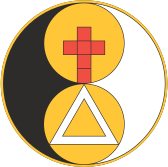The Place of the Mage in Cosmos
 Given that the main tap-root of the Golden Dawn is in Neoplatonic theurgy, we can start there to ask questions about the place and nature of the individual soul, and especially that of the mage, in the architecture of the Cosmos. A recent contemplation lead me to an interesting proposition…
Given that the main tap-root of the Golden Dawn is in Neoplatonic theurgy, we can start there to ask questions about the place and nature of the individual soul, and especially that of the mage, in the architecture of the Cosmos. A recent contemplation lead me to an interesting proposition…
In Neoplatonic cosmology, which in the Golden Dawn is delivered to us in the form the Qabalistic Tree of Life, all derives from the One. The One is the grand unity of being (actually in NeoP, the ultimate, ineffable One, lies even beyond being [on], but for today let’s set that aside), that first Being from which the rest come. In the Timaeus, the lowest extension of the One called the Demiurge, referenced the Paradigm in order to create the Gods and all lesser Beings. Each of the Gods are made from a portion of the Paradigm, each becoming a principle of existence over which They can be said to ‘rule’. Being made from the same grand design gives the Gods Their unity while being made from a part of the Paradigm, gives Them their particularity. The rest of the hierarchy of continuity from the One to Matter then descends from the One through the Gods, then through the Archangels, Angels, Deamons, Heroes and Souls (to simplify a bit) then arguably including animals and plants until Matter is reached. Matter in Neoplatonism is the lowest or furthest emanation of the Divine, as contrasted to Gnosticism where matter is evil.
We, as incarnate entities, are Souls in this hierarchy and our Mighty Dead are Heroes. The fully successful and realized Mage can attain the rank of Angel and help administer the Cosmos (this is what gives us our powers), but we never become Angels even in death because that would leave a gap in the hierarchy. Our roles as Souls are as important to the whole of creation as the Gods and other Spirits their roles, if the Cosmos is to whole and complete, ‘perfect’ in the terms of the Ancients.
It was while contemplating this structure, which you can find nicely explained in Iamblichus’ De Mysteriis, and more thoroughly in Proclus’ Elements of Theology and Platonic Theology, I realized that those of us who do the work of theurgy and become proper microcosms of the Macrocosm, the Cosmos itself, may have a power, strength, or capacity, that even the Gods do not have. The Gods, while they may at some level be microcosms, and this is perhaps especially true of the Gods who have attained to enlightenment, nonetheless may be too fixed in their particularity, be too specifically what They are, namely being one of the very Structures of Existence, to ever truly be able to mirror and instantiate the Whole. We magi, not being anything in particular, they may attain to the Whole in a way the very Gods may not. We, in a more complete and balanced way become instances of the One that is All in a manner that even the Gods may not attain to. An exhilarating and daunting notion.
Perhaps it is from the intuition of this idea that leads to images in the Timaeus and the Hermetica in which the Demiurge says that if the Souls do not do their part in creation, Creation will be incomplete and imperfect, and where the Gods gaze upon [human] Souls and are moved to shower gifts upon them. Perhaps it is from here that the image of the Divine Anthropos, Adam Cadmon for the Jews, Parusha for the Indians, comes, displaying the human form as the manifest Divine.
This all makes me mindful of the need to make ourselves whole, becoming microcosms, and the gratitude that arises in knowing we have in the Golden Dawn to tools for accomplishing this great, even Divine, end.
q.e.s,
praemonstrator general
